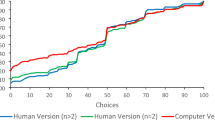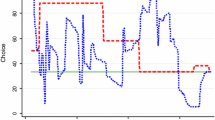Abstract
Protocol analysis, in the form of concurrent verbal ‘thinking aloud’ reports, is a method of collecting and analyzing data about cognitive processes. This approach can help economists in evaluating competing theories of behavior and in categorizing heterogeneity of thinking patterns. As a proof of concept, I tested this method in the context of a guessing game. I found that concurrent think aloud protocols can inform us about individual’s thought processes without affecting decisions. The method allowed me to identify game theoretic thinking and heterogeneous approaches to unravelling the guessing game. The think aloud protocol is inexpensive and scalable, and it is a useful tool for identifying empirical regularities regarding decision processes.





Similar content being viewed by others
Notes
Confusion happens when the environment the researcher has setup to observe behaviors is not the same environment perceived by the subjects.
There are many important contributions on communication in experimental settings. Here I narrowed my attention to works that more explicitly used verbal reports to trace decision processes. See Brandts et al. (2019) for a review of the communication literature in experiments.
A criticism of TAP is that participants may feel watched and/or judged by the experimenter when expressing their thoughts. The additional incentive to elicit thought processes could have accentuated this problem. However, after having run pilot experiments, I realized that subjects at my university needed incentives to write. The instructions are included in the supplemental materials.
CRT − 16.161 (5.852); z_errWM 9.598 (4.550); z_Imotiv − 6.617(5.818). Robust SE in parentheses.
Disagreements had to do mostly with D > 2 and L > 2 classifications. That said, the method is not devoid of error, but I devised the majority voting rule to reduce error in classifying subjects.
This particular individual’s second round choice was 70!
See Penczynski (2018) for an exploration of the use of machine learning techniques for analyzing communication content from experiments.
References
Agranov, M., Caplin, A., & Tergiman, C. (2015). Naive play and the process of choice in guessing games. Journal of the Economic Science Association, 1(2), 146–157.
Bosch-Domenech, A., Montalvo, J. G., Nagel, R., & Satorra, A. (2002). One, two, (three), infinity: Newspaper and lab beauty-contest experiments. American Economic Review, 92(5), 1687–1701.
Brandts, J., Cooper, D., & Rott, C. (2019). Communication in laboratory experiments. In A. Schram & A. Ule (Eds.), Handbook of research methods and applications in experimental economics. Cheltenham: Edward Elgar Publishing Ltd.
Brown, T. C. (2005). Loss aversion without the endowment effect, and other explanations for the WTA–WTP disparity. Journal of Economic Behavior & Organization, 57(3), 367–379.
Bühren, C., Frank, B., Krabel, S., & Werner, A. (2012). Decision-making in competitive framings—Strategic behavior of chess players in mini-ultimatum game chess puzzles. Economics Letters, 115(3), 356–358.
Burchardi, K. B., & Penczynski, S. (2014). Out of your mind: Eliciting individual reasoning in one shot games. Games and Economic Behavior, 84, 39–57.
Cacioppo, J. T., Petty, R. E., & Feng Kao, C. (1984). The efficient assessment of need for cognition. Journal of Personality Assessment, 48(3), 306–307.
Camerer, C. F., Ho, T. H., & Chong, J. K. (2004). A cognitive hierarchy model of games. The Quarterly Journal of Economics, 119(3), 861–898.
Chou, E., McConnell, M., Nagel, R., & Plott, C. R. (2009). The control of game form recognition in experiments: Understanding dominant strategy failures in a simple two person “guessing” game. Experimental Economics, 12(2), 159–179.
Cooper, D. J., & Kagel, J. (2005). Are two heads better than one? Team versus individual play in signaling games. American Economic Review, 95(3), 477–509.
Cooper, D. J., & Kagel, J. (2016). A failure to communicate: An experimental investigation of the effects of advice on strategic play. European Economic Review, 82, 24–45.
Costa-Gomes, M. A., & Crawford, V. P. (2006). Cognition and behavior in two-person guessing games: An experimental study. American Economic Review, 96(5), 1737–1768.
Duffy, J., & Nagel, R. (1997). On the robustness of behavior in experimental beauty-contest games. Economic Journal, 107, 1684–1700.
Earl, E., Friesen, L., & Shadforth, C. (2019). Elusive optima: A process tracing analysis of procedural rationality in mobile phone connection plan choices. Journal of Economic Behavior & Organization, 161, 303–322. https://doi.org/10.1016/j.jebo.2019.03.021.
Ericsson, K. A., & Simon, H. A. (1980). Verbal reports as data. Psychological Review, 87(3), 215–251.
Ericsson, K. A., & Simon, H. A. (1993). Protocol analysis: Verbal reports as data. Cambridge, MA: MIT Press.
Fox, M. C., Ericsson, K. A., & Best, R. (2011). Do procedures for verbal reporting of thinking have to be reactive? A meta-analysis and recommendations for best reporting methods. Psychological Bulletin, 137(2), 316–344. https://doi.org/10.1037/a0021663.
Frederick, S. (2005). Cognitive reflection and decision making. Journal of Economic perspectives, 19(4), 25–42.
Grosskopf, B., & Nagel, R. (2008). The two-person beauty contest. Games and Economic Behavior, 62(1), 93–99.
Highhouse, S. (1994). A verbal protocol analysis of choice under ambiguity. Journal of Economic Psychology, 15(4), 621–635.
Ho, T.-H., Camerer, C. F., & Weigelt, K. (1998). Iterated dominance and iterated best response in experimental ‘p-beauty contests’. American Economic Review, 88, 947–969.
Johnson, P. E., Durán, A. S., Hassebrock, F., Moller, J., Prietula, M., Feltovich, P. J., et al. (1981). Expertise and error in diagnostic reasoning. Cognitive Science, 5(3), 235–283.
Larkin, J., McDermott, J., Simon, D. P., & Simon, H. A. (1980). Expert and novice performance in solving physics problems. Science, 208(4450), 1335–1342.
Nagel, R. (1995). Experimental results on interactive competitive guessing. The American Economic Review, 85, 1313–1326.
Nisbett, R. E., & Wilson, T. (1977). Telling more than we can know: Verbal reports and mental processes. Psychological Review, 84, 231–259.
Penczynski, S. P. (2018). Using machine learning for communication classification. Experimental Economics. https://doi.org/10.1007/s10683-018-09600-z.
Ranyard, R., Hinkley, L., Williamson, J., & Mchugh, S. (2006). The role of mental accounting in consumer credit decision processes. Journal of Economic Psychology, 27, 571–588.
Ranyard, R., & Svenson, O. (2011). Verbal data and decision process analysis. In M. Schulte-Mecklenbeck, A. Kühberger, & R. Ranyard (Eds.), A handbook of process tracing methods for decision research: A critical review and user’s guide (pp. 115–130). New York: Taylor & Francis.
Russo, E. J., Johnson, E. J., & Stephens, D. L. (1989). The validity of verbal protocols. Memory and Cognition, 17, 759–769.
Ryan, M., Watson, V., & Entwistle, V. (2009). Rationalising the ‘irrational’: A think aloud study of discrete choice experiment responses. Health Economics, 18(3), 321–336.
Schkade, D., & Payne, J. (1994). How People respond to contingent valuation questions: A verbal protocol analysis of willingness to pay for an environmental regulation. Journal of Environmental Economics and Management, 26, 88–109.
Smith, R. D. (2007). The relationship between reliability and size of willingness-to-pay values: A qualitative insight. Health Economics, 16(2), 211–216.
Stahl, D. O. (1996). Boundedly Rational rule learning in a guessing game. Games and Economic Behavior, 16(2), 303–330.
Stahl, D. O., & Wilson, P. W. (1995). On players’ models of other players: Theory and experimental evidence. Games and Economic Behavior, 10(1), 218–254.
Turner, M., & Engle, R. W. (1989). Is working memory capacity task dependent? Journal of Memory and Language, 28(2), 127–154.
Unsworth, N., Heitz, R. P., Schrock, J. C., & Engel, R. (2005). An automated version of the operation span task. Behavior Research Methods, 37(4), 498–505.
Weber, R. A. (2003). ‘Learning’ with no feedback in a competitive guessing game. Games and Economic Behavior, 44(1), 134–144.
Author information
Authors and Affiliations
Corresponding author
Additional information
Publisher's Note
Springer Nature remains neutral with regard to jurisdictional claims in published maps and institutional affiliations.
Electronic supplementary material
Below is the link to the electronic supplementary material.
Rights and permissions
About this article
Cite this article
Capra, C.M. Understanding decision processes in guessing games: a protocol analysis approach. J Econ Sci Assoc 5, 123–135 (2019). https://doi.org/10.1007/s40881-019-00074-0
Received:
Revised:
Accepted:
Published:
Issue Date:
DOI: https://doi.org/10.1007/s40881-019-00074-0




